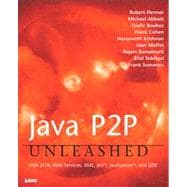
Java P2P Unleashed Lead Author Bio
Robert Flenner is an independent Java software developer based in Texas. He contributed to Professional Jini (Wrox) and Professional Java eCommerce (Wrox). Robert is a regular contributor to the O'Reilly ONJava Web site, where he is currently publishing a series of articles related to Jini and JavaSpaces. He has been involved in managing, architecting, and developing information systems for 17 years. His most recent book is Jini and JavaSpaces Application Development (Sams), published in December 2001.
Contributing AuthorsMichael Abbott has more than 10 years of distributed computing experience, has been published in several peer-reviewed journals, and speaks regularly on XML and distributed transaction management. Mike founded METAmorphosis, a company focusing on managing distribution transactions across heterogeneous databases, and is currently working with code. Mike is very involved in the computing community—he participates on a JSR Expert Group at Sun, participates on a technical committee at OASIS, is currently the president of the BEA User Group in Silicon Valley, and has chaired the XML Sig for the Software Development Forum for the past two years.
Mike was most recently the CTO and Executive-Vice President of Electron Economy, a supply chain software company, prior to its acquisition by Viewlocity. During his tenure there, Electron Economy was named to Upside's Top 100 companies of 2000 and filed four technical patents. Mike also serves on the board of directors for Innogenex, and on the strategic advisory board to SchemaLogic. He holds a B.S. degree in biochemistry with a focus in computer science from California Polytechnic State University, and has completed Ph.D. work at the University of Washington.
Toufic Boubez is the Chief Technology Officer of Layer 7 Technologies, specializing in Web services security. While at IBM, he was a senior technologist in the Emerging Technologies group and the chief architect of IBM's Web services initiative, as well as the architect of the first iterations of the IBM Web Services Toolkit. He was also IBM's technical representative to UDDI, and a coauthor of the UDDI V1 API specification. Toufic represented IBM on other standards bodies, such as the UN/CEFACT/OASIS ebXML initiative, and helped drive IBM's early XML and Web services strategy. He has acted as technical chair for the XML Web Services One Conference, and technical chair for various tracks.
Toufic has more than 15 years of experience in IT and has presented and published papers in the areas of Web services, XML, software agents, machine learning, object technology, B2B, business modeling, simulation, neural networks, wavelet analysis, and distributed computing. He is the coauthor of Building Web Services with Java (Sams).
Frank Cohen is a software entrepreneur who has contributed to the worldwide success of personal computers since 1975. He has written operating systems for microcomputers, helped establish video games as an industry, helped establish the Norton Utilities franchise, lead Apple's efforts into middleware and Internet technologies, and is currently serving as principal architect for the Sun Community Server, Inclusion.net, and TuneUp.com. Frank is principal maintainer for the open-source TestMaker project and is CEO for PushToTest, a scalability and performance testing solutions company. Previously, Frank authored Testing Web Services (Osborne McGraw-Hill, 2002) and contributed to Java Web Services Unleashed (Sams, 2002). You can reach Frank at fcohen@pushtotest.com.
Navaneeth Krishnan works for Sun Microsystems's Sun ONE Identity Server group in Bangalore, India. He has extensive experience in designing and developing J2EE-based application frameworks and solutions. His current focus is on user identity management, Web services and peer-to-peer technologies. He has been involved in JXTA since mid-2001, and strongly believes that it has the potential to make a significant impact in the area of peer-to-peer computing.
He spends his spare time writing articles, contributing to books, and exploring the endless possibilities created by emerging technologies. Previously, he contributed to JXTA: Java P2P Programming (Sams).
Alan Moffet has over 20 years of development (C++, Java, Smalltalk, XML) and management experience with companies such as Northern Telecom (Texas). He is currently an independent consultant whose interests are in distributed systems, systems architecture, components and objects, and software engineering. He specializes in the application of emerging technologies and improving organizational development capacity.
Rajam Ramamurti is a designer and developer who specializes in creating documentation for a variety of technologies, including J2EE, EJB, XML, and C++. Clients have included Gene Logic, Kanisa, Netscape, Oracle, and Progress Software, for whom she conducted training sessions on EJB architecture. She holds a master's degree in linguistics from the University of Pennsylvania.
Bilal Siddiqui is an electronics engineer, an XML consultant, and the co-founder of WaxSys, a company focused on simplifying e-business. After graduating with a degree in electronics engineering from the University of Engineering and Technology, Lahore, in 1995, he began designing software solutions for industrial control systems. Later he turned to XML, and used his experience programming in C++ to build Web- and WAP-based XML processing tools, server-side parsing solutions, and service applications. He is a technology evangelist and a frequently published technical author.
Frank Sommers is CEO and founder of Autospaces, a company focused on bringing Jini technology and Web services to the automotive software market. He has been developing Java-based software since attending Sun Microsystems' first Java conference in November, 1995. Frank's interests include parallel and distributed computing, the discovery and representation of knowledge in databases, and the philosophical foundations of computing.
I. INTRODUCING P2P.
1. What Is P2P?II. P2P SYSTEMS AND ARCHITECTURE.
III. BUILDING DISTRIBUTED SYSTEMS USING JAVA.
IV. SAMPLE P2P APPLICATIONS.
A. APPENDIX.
The New copy of this book will include any supplemental materials advertised. Please check the title of the book to determine if it should include any access cards, study guides, lab manuals, CDs, etc.
The Used, Rental and eBook copies of this book are not guaranteed to include any supplemental materials. Typically, only the book itself is included. This is true even if the title states it includes any access cards, study guides, lab manuals, CDs, etc.